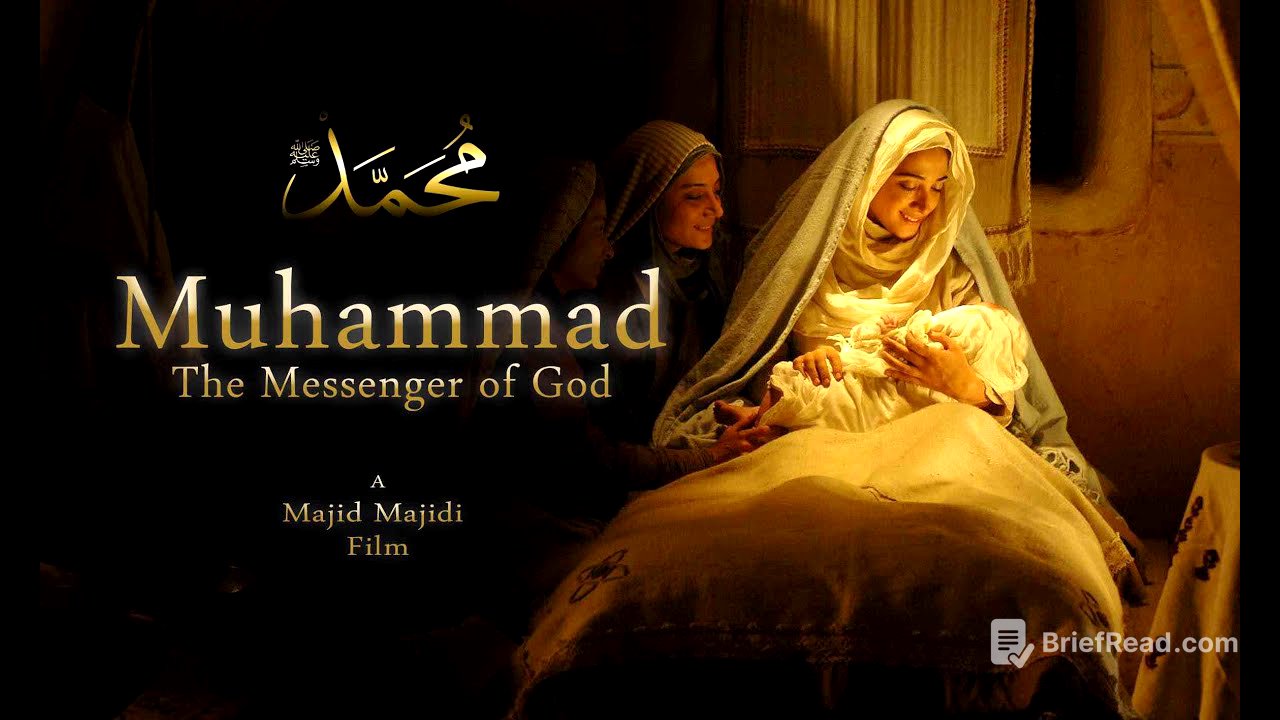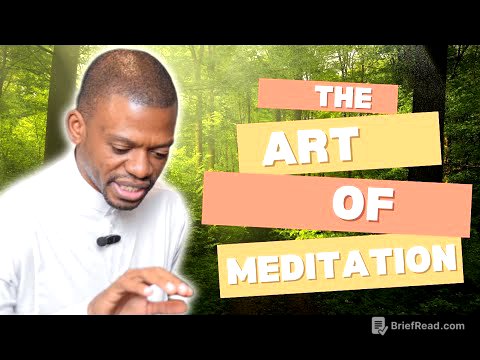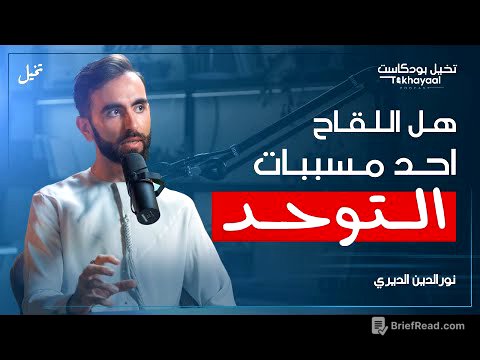TLDR;
This video tells the story of the early life of Prophet Muhammad, focusing on the challenges he and his followers faced in Mecca, including persecution, embargoes, and threats to his life. It also highlights key events such as the naming of Muhammad, his time with his wet nurse Halima, his journey to Syria with his uncle Abu Talib, and the growing signs of his prophethood recognized by some. The narrative emphasizes themes of faith, resilience, and divine protection.
- The story of the early life of Prophet Muhammad.
- Challenges faced by him and his followers in Mecca.
- Key events such as his birth, childhood, and journey to Syria.
- Themes of faith, resilience, and divine protection.
Supporting the Oppressed and the Quraysh Treaty [2:40]
The chapter starts with a tense confrontation where someone accuses Hamza of disrespecting the Quraysh treaty by supporting the oppressed. The speaker asserts that all inhabitants of Mecca are obligated to him and warns of betrayal. He accuses Hamza of breaking the treaty by helping while doubting, stating that the treaty smells of fratricide. He threatens violence if Hamza continues on his current path, while Hamza boldly declares that he is talking to his enemy face to face and does not fear them.
The Polytheists' Plot and the Muslims' Refuge [4:53]
The polytheists, unsatisfied with merely persecuting the Prophet Muhammad, plot to kill him. Muhammad and his companions are forced to leave Mecca and seek refuge in the branches of Abu Talib, a valley between two mountains near Mecca. The polytheists impose a harsh embargo, preventing food, goods, and movement to and from the Muslims based on a signed treaty. The Muslims endure extreme suffering, poverty, and hunger during this time.
Amina's Birth and the Lifting of the Embargo [6:21]
During the Muslims' hardship, a baby girl named Amina is born, and the Prophet Muhammad declares her steps blessed, naming her after his mother. News of the embargo spreads, unintentionally increasing the fame of the religion. The leaders of Mecca expect Muhammad and his followers to show patience and tolerance, but the Muslims' steadfastness causes division among the Meccan leaders. Abu Talib gathers the leaders of his tribe, emphasizing the importance of protecting the Prophet's house.
Abu Talib's Dilemma and Mecca's Division [8:22]
The chapter shows Abu Talib's internal conflict and his conversation with others about the embargo. Ali advises Abu Talib to stay by the Prophet's side, while others question the point of opposing the lifting of the embargo. Some express their longing for relatives in Banu Hashim, while others are willing to close their eyes to the visible God and entrust their hearts to the invisible God. The conversation touches on themes of faith, family ties, and the willingness to share journeys and meals with slaves.
Abu Talib's Wisdom and the Price of Faith [10:37]
Abu Talib welcomes a Quraysh elder, reflecting on Mecca's growth and the diminishing status of its famous figures. He recalls Khadija's greatness and contemplates Muhammad's potential. The elder reveals his heart has been enlightened by Muhammad's invitation but questions the price Abu Sufyan would pay to convert. Abu Talib emphasizes that faith is not a trade and that Abu Sufyan is God's chosen one. He suggests Muhammad should keep his God in his heart and be a pillar of the city's prosperity.
The End of Strength and the Looming War [12:59]
The strength of Qom has ended, with everyone having a vote and a white pact made. The speaker feels powerless to stop the impending war. Abu Talib is warned that if Muhammad does not give up his claim, the Bani Hashim will stop supporting him, leading to a defenseless Prophet facing danger. Despite the looming war, Hashem knows of the mercy and protection Abu Talib provides.
The Prayer and the Elephant Riders [14:33]
The chapter includes a prayer invoking Allah, praising Him as the Most Gracious, the Most Merciful, and the Lord of the Worlds. It references the story of the Lord's action with the companions of the elephant, questioning whether their plan was not made to go astray. It describes how flocks of birds were sent to target them with small stones, scattering them like eaten leaves.
Abdul Muttalib's Return and the Captured Camels [17:50]
Abdul Muttalib's presence calms those around him. He learns that the elephant army has captured all of his father's camels, and the elders of Taif are also lamenting. The army of Abra has captured all the camels. He instructs Amina to be given to Fatima and asks for care to be taken of those fleeing and staying in the Kaaba.
Abdul Muttalib's Greatness and the Kaaba's Destination [20:35]
Abdul Muttalib declares himself the great of Mecca, stating that great men from every city have come to his feet. He laments that the Kaaba, once a destination for Aziz, is now reduced and will be destroyed in war. He requests the return of his camels, stating that the soldiers did not fight to take his booty. He emphasizes that he is only the owner of the camels, while the city and the house have their own owner.
The Ruler of Yemen and the Secret of the Kaaba [23:45]
The ruler of Yemen asserts his authority, stating that his king's command in Abyssinia comes from the temple. He questions the secret of the Kaaba, acknowledging it is all stone and not built by any ruler's order. He demands the return of his camels and camel driver, ordering his army to get away.
Prayer for the House of God [25:51]
A prayer is offered, acknowledging that the house belongs to God and that everyone is part of His family and residents of His sanctuary.
The Elephants and the Sanctuary of Mecca [27:54]
God willed that the elephants should not enter the sanctuary of Mecca and should not approach the Kaaba.
Feeding the Hungry and the Auction of Honor [37:48]
Everyone is encouraged to feed the hungry at a feast. A brother is welcomed, and the feast is said to be given by relatives and elders. The conversation touches on themes of honor, parenthood, and family reconciliation. The speaker expresses pain that Abdullah did not resemble him and that the lottery was drawn in the name of his heart without an owner.
The Naming of Muhammad [40:44]
The chapter transitions to the naming of Muhammad, with all the sons of Abdul Muttalib from the family of Hashem naming their sons after the idols of their tribe. However, Abdul Muttalib goes to the Black Stone and seeks blessings from this heavenly stone, a reminder of the time of Abraham.
Muhammad's Name and Suwayba's Breastfeeding [46:54]
Abdul Muttalib names his son Muhammad, a name that is praised and seen as a remembrance of God, not of idols. Suwayba, a maidservant, is breastfeeding the newborn, abandoning her mistress's work to care for the child. Amina is not happy that her maid is breastfeeding the baby.
Seeking a Nanny and the Umayyads' Influence [50:38]
A group seeks to share a child's evil in exchange for bread, as the naming ceremony has passed. They encounter Abdul Muttalib, who states that his slave girl, Suwayba, is going to waste. He refuses to sell her, as she was a gift to his wife. The conversation touches on the influence of the Umayyads and the speaker's resentment towards his brothers.
Halima's Arrival and the Picky Lady [58:53]
Someone is taking Jamil, who is not alive, to the market to earn some money. Halima arrives, hoping to be chosen by a picky lady who pays well. She is accepted, despite her appearance, as the lady is in need.
Halima's Milk and the Beginning of a Journey [1:05:44]
Halima finds that she has no milk to feed the child, but after maternal longing, the child accepts her breast. Muhammad's two-month-old journey begins, which is wonderful for all but sad and exhausting for Amina.
Protecting from Evil and Visiting Relatives [1:09:59]
The chapter discusses keeping devils and evil spirits away from children. Muhammad is on the ground, and the path is difficult. The love and affection of a mother and child, separated for years, finds the opportunity to appear and manifest on a journey to visit relatives.
The Kaaba and the Water of Zamzam [1:33:21]
The chapter discusses the Kaaba and how, instead of worshiping the one God, people only saw the Kaaba and took its stones to worship as they wanted, forgetting the God of Abraham and his religion. The water of Zamzam stopped boiling.
Amina's Arrival and the Resemblance to Abdullah [1:36:36]
Amina arrives, expressing her joy at seeing Muhammad after years of being away. She notes that his eyes remind her of Abdullah. She is welcomed, and the children are asked to take care of Muhammad.
Amina's Wish and Abdullah's Memory [1:41:41]
Amina recalls her wish as a child to reach the sky and the tallest fruit on the tree. She remembers Abdullah as a beautiful, dignified, and pure man with sunshine on his face. God accepted Amina's wish and blessed her with Abdullah, although their union was brief.
The Difficulty of the Road and the Thirsty Lips [1:43:46]
Muhammad and Amina prepare to leave, with Amina feeling better and having the strength to go. She asks Muhammad to make the place his second home and prays for a safe journey. In a thirsty sleep, someone took a sip but swallowed Muhammad's thirsty lips and lifeless body, seeking an answer for this.
The Attackers and the Village of Aboab [1:47:00]
The chapter discusses attackers who were clearly looking for a mother and a child. Amina felt bad and had to be taken to the village of Aboab. The attackers were told that she returned to Yathrib.
The Rains and the Stars [1:48:08]
The rains have ended, and the stars are numerous and playful. The world will end one day, but the only thing that remains is love and friendship.
Amina's Entrustment and Departure [1:49:42]
Amina entrusts Muhammad to God alone and departs.
Abu Talib and the Hajj [1:57:37]
Abu Talib is mentioned as the father of Muhammad. The chapter discusses how people used to go around the Kaaba in ignorance, confusing ancient worship with polytheism and idolatry. However, they still perform Hajj, which is the legacy of Ibrahim Khalil, according to his religion.
The Great Merchant and the Gemologist [2:00:33]
A great merchant of Mecca steps into a tent, and the speaker identifies himself as a gemologist. He mentions Khaybar and the lineage of the merchant's father, suggesting that the future of Musa al-Mahjaj will not hinder their trade and Mecca. He proposes a treaty and accompanies the merchant to visit his father.
Abu Talib's Illness and Muhammad's Protection [2:02:10]
Abu Talib is ill, and he gathers everyone in the house, telling them not to let their hearts be troubled. He emphasizes that Muhammad is dear to all of them. He reflects on how Muhammad lost milk as a child and did not smell his father's scent or taste the full compassion of his mother. He sees Muhammad as his only protection.
The Slave Girl and the Pawned Wife [2:06:47]
Coins are being sold, and Ali is urged not to sell. The lord of Omar has made a deal for a slave girl. Muhammad pays attention and promises to return double the money within a certain period, also pawning his wife for money. He asks for a chance to pay off his debt, and Abu Talib vouches for his truthfulness.
The Simpleton and the Daughter of Mercy [2:11:22]
Someone is called a simpleton for coming from afar to see their daughter. They are warned that they will end up as a captive and slave of the husband's tribe. The speaker offers his own daughter, calling her a daughter of mercy.
Abdul Aziz and Muhammad's Freedom [2:14:04]
Abdul Aziz is questioned about what is left in Mecca that is not in his work, with the answer being Muhammad for his mother, who freed him. The speaker is urged not to be helpless and to leave Abu Talib alone.
The Synagogue and the Message for Samuel [2:15:34]
The speaker is instructed to go to the synagogue and ask for Baruch, telling him that this is a message for Samuel.
The Stone Throwers and the Arab Caravan [2:19:16]
People are being stoned and urged to keep their distance. The speaker praises the Arab caravan and states that this is what Jesus wanted. He invites them to be their guests, and Uncle John accepts their invitation.
The Comforter and the Spirit of Truth [2:20:50]
The protector of the needy is mentioned, and it is said that Muhammad lives with them like a loving son. The speaker states that this is also a sign, as he is alone and the umbrella of God is over his head. He references God's word giving the good news of another Comforter to abide with them, the Spirit of truth.
The Words of Christ and the Hatred of the Chosen Ones [2:23:09]
The chapter discusses treating others as you would have them do to you, referencing the words of Christ. It is said that the first teaching is to know that your God is the only God, found in broken hearts. The speaker notes the hatred in the land for those who have never tolerated their chosen ones, seeking a savior with their tongues but terrified in their hearts.
The Sign of Prophecy and the Dangerous Road [2:25:04]
The speaker mentions a sign of prophecy, having its shoulder in their midst. He warns of a dangerous road and advises leaving the sept there, returning to Mecca to protect it. He demands that whatever remains of the caravan must leave his land.
The Army and the Euphrates [2:26:44]
The speaker notes that the army is powerful and strong, but the road will not lead anywhere. He suggests hiring more Euphrates and letting the battle be between them. He instructs some to go ahead with archers and hire men to fight, while others shadow the caravan.
The Horseman and the Rider [2:27:43]
The speaker praises the plan of leaving the caravan later than the main convoy. He notes that no horse leaves the horseman and runs away unless his rider has run away.
The Sea and the Wounded [2:31:45]
The chapter discusses putting the engines to sleep and being calm. The speaker questions where the men are, noting that the sea is not wounded and cannot withstand the journey. He asks where to find it.
The Ghadir Battle and the Great Movement [2:33:58]
The speaker suggests dividing what they have among them, just as much as they can, enough of the Ghadir battle. He laments the great movement that brings them together but sees them apart, noting that a woman and her children are the victims of their silence.
The Victims and the Sea [2:38:51]
The chapter focuses on the victims and the sea, with someone urging others to get away from there.
The Messenger of God and the Treaty of Boycott [2:43:02]
The Prophet's father is calling, and Muhammad, the Messenger of God, is commissioned to deliver the message of God in a loud voice. The message is that the treaty of boycott of Muslims is no longer in force, a treaty that the leaders of Quraysh did not sign. The speaker questions where the unseen God of Muhammad is, daring to stand before their gods.
The Proof and the Night of Battle [2:45:04]
The speaker challenges the claim that the treaty of boycott is no longer in force, demanding proof. He states that the end of the treaty is when he asks the elders of Quraysh to ask. He questions with what treaty they have raised the sword as a banner of war and urges them to reveal the treaty they have written in secret.
The Termites and the Call to Truth [2:46:10]
The speaker claims that God revealed to His Messenger a treaty that is alive, but termites destroyed it. He urges them to reveal it if it is other than this. He states that without this is magic and calls on the people to consider this a sign of the call to truth and turn to God.
Abu Talib and the Sword [2:48:39]
The speaker states that this is the sign of their victory and urges Abu Sufyan not to doubt any more than this, as his sword will still cut. He notes that as long as Abu Talib is a general of Muhammad, nothing can be done.
The People of the Repentance and the Right Path [2:49:13]
The chapter includes verses from the Quran, urging the People of the Repentance to come and worship only Allah, not proclaiming anything or taking each other as lords besides Allah. It states that the right path has turned away from ignorance and that whoever flees from the Taghut and believes in Allah has grasped the handle of the handcuff.
The Peace and Blessings of God [2:52:05]
The chapter concludes with a prayer for peace and blessings upon Muhammad.









